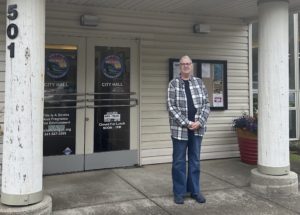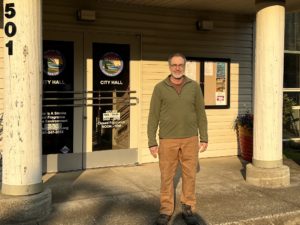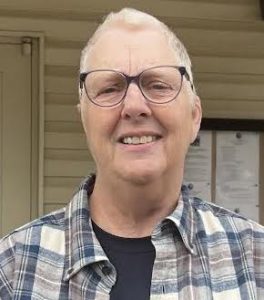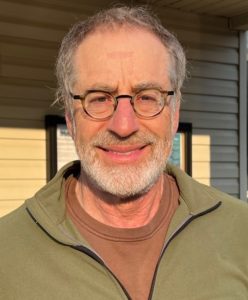

By QUINTON SMITH/YachatsNews.com
YACHATS – A Yachats city councilor who sought the mayor’s office four years ago is facing off against the chair of a city commission frustrated by the council’s inaction on a number of issues the past two years.
But whether Councilor Ann Stott or Parks & Commons Commission chair Craig Berdie is elected Yachats mayor in the Nov. 8 general election, both say their biggest aim is to help get or keep the city on track after more than two years of chaotic governing and management.
Either would bring different styles and approaches to doing that. Both indicate they would bring a different approach to spending, council operations and overseeing the city manager than Mayor Leslie Vaaler, who is not seeking re-election after one term.
The new mayor who takes office in January will be the fourth in the past eight years. Gerald Stanley was elected in 2016, followed by John Moore for one term in 2018, and then Vaaler in 2020.
Ron Brean, a former California state parks administrator, was elected four times between 2008 and 2014 – only once facing opposition. But he moved to southern Oregon as Yachats went to a city manager/council form of government – and since then the city has had three permanent city managers and two interim managers.
Stott is a retired Utah high school social studies and civics teacher who moved to Yachats in 2017 and almost immediately got involved in city issues when she tried unsuccessfully to address lighting on Driftwood Lane where she lives.

“It sucked me right in,” Stott told YachatsNews. “Most people think government is boring. I thought ‘Wow, I can help’.”
She jumped into city politics by running for mayor in 2018, losing to Moore. She then ran for one of two council seats in November 2020, finishing as the top vote getter in a five-way race.
Stott says she’s learned a lot in her two years on the council, helping her to not over-react to problems, issues or successes. She resigned as council president in 2021 out of frustration with the council’s work only to accept the position this year.
“I think I’ve calmed down a bit,” Stott said. During a candidate’s fair Sunday, she said the past two years “have been on-the-job training for me.”
Stott’s council term is for four years, so if elected mayor the council will have to fill the remaining two years via appointment.
Berdie spent his professional career in Minnesota working in data communication, training, rural economic development, project management and finishing his career with 3M. He moved to Yachats in 2015, and got involved by volunteering in community activities. He accepted a four-month appointment to the council in 2018 to fill a sudden vacancy and has been on the Parks & Commons Commission for three years, now serving as it chair.

He was frustrated by the council’s long, start-and-stop self-guided search for a city manager and then the reluctance of new city manager Heide Lambert’s to embrace two years of work by city commissions. He’s critical of the mayor’s or council’s reluctance to move ahead or spend on projects city commissions are asking for and the lack of progress on water issues.
There is a nuance to their statements on how they would approach the mayor’s role. Both express frustration at Vaaler’s tight control of council agendas and general unwillingness to spend money – the city has plenty of revenue — on projects.
Stott believes Lambert is finally getting her footing after inheriting massive personnel problems at city hall. “I promise to spend,” she said Sunday.
Berdie said he wants to focus on “administrative excellence” and to look at city “expenditures as investments in the community.”
“I’d like the emphasis to be getting to ‘Yes’,” he told YachatsNews.
YachatsNews asked both candidates 10 questions. Here are their responses.
Question: Why are you running for mayor of Yachats?
Stott: Yachats and its residents welcomed me with open arms. When I moved here, I felt I won the friend lottery. So many people have given me so much, and let me be a part of the community. I wanted to volunteer my expertise, time, and energy as a way to give back. My expertise: Government.
Berdie: I believe that we can be a great city. We can shine as the gem of the coast. We can look forward while still being fiscally responsible. In short, I want to make this an exciting, well-run place to live and visit.
Question: What in your professional background or previous experience on city commissions or the city council makes you the best choice for this position?
Berdie: Professionally, I have a history of successfully leading direct reports and managing complex projects. As a global manager at 3M, I lead colleagues in over 40 countries in establishing best practices and performance monitoring. As first a member and recently chair of the Parks and Commons Commission, I have worked collaboratively with a talented group of people who are deeply committed to sustaining our parks, trails, and 100-year-old Commons. I also briefly served on the City Council where I initiated a review our annual objectives so that we could better focus our efforts.
Stott: As a social science educator for more than 30 years, I had to take complex topics and make them easily understood by 17-year-olds. This takes patience and persistence. Over the past two tumultuous years serving as a city councilor, patience and persistence were required to deal with some of the self-inflicted wounds we experienced as a community. We are now in a much better position. We have a very good city manager who is bringing in high quality staff. We are focused on infrastructure and making our city warm, welcoming, and safe for all Yachatians. There is still more to accomplish with patience and persistence.
Question: Staffing in city hall has been an issue for 1-2 years. Is it the mayor’s role to help the city manager deal with staffing, organization structure and other operational issues? If so, how would you do that? If not, why not?
Stott: The council’s role is to hire a city manager and let them manage. Where we can help is making resources available to the city manager in terms of compensation and other budget appropriations. It is important for the council to communicate a sense of direction for the city and then allow the manager to do her job. The mayor is not a micromanager. Micromanaging a city manager runs the risk of losing the city manager, a potential self-inflicted wound.
Berdie: The mayor and city council cannot be directly involved in management but, like any oversight organization, they set priorities, provide resources and work with city management to establish measures for success. The current council was very generous at providing sufficient staff positions for success. I believe that better leadership from the mayor will help our city manager. Specifically, her primary efforts should be on developing a road map to water sustainability and fully staffing and providing the council with reports showing measurable progress towards the council’s goals. I will also encourage the manager to spend approved funds. We need to trust and enable her to get things done.
Question: Many people and some commissions are frustrated that issues and/or projects that have been on the city’s radar for 2-3-4 years have not been addressed. Do you feel that’s an issue? If so, how would you address it?
Stott: I am frustrated too. We can blame the pandemic, but that is not the full story. We lacked several things. Lack of a city manager and city staff hurt the direction of these projects. The lack of prioritization of projects and communicating that priority to our Yachats community created much of the frustration to which you are referring. The city manager recently hired a Capital Improvement Project coordinator who is creating a logical model of the project process and a rating system for projects to prioritize them. The city manager will be working with the newly re-organized Finance Committee to finalized funding for projects and begin work on them.
If this process works and we continue to effectively communicate why certain projects are high versus low priority, the frustration level should abate. I cannot eliminate all frustration, because community members advocating for low priority projects will continue to be frustrated.
Berdie: I feel this frustration. The council approved and included in the budget multiple projects proposed by the Parks and Commons Commission. Yet, when it is time to implement, the council modifies, changes directions, or wants a large overriding plan. This delays projects even after the commissions have done considerable work. The reasons for delay are often difficult to understand.
These delays add costs. My leadership skills and experience can help the council stay on track and understand the cost of indecision as contractors either will not bid or add a “Yachats Factor” to their estimates. We need to develop our requirements and stick with our decisions.
Question: Related to that: name your top three city projects to get off the ground, or get accomplished, in 2023?
Berdie: Water — Plans for long-term sustainably and East Second Street (which is about water); Safety — delineators on U.S. Highway 101, the boardwalk at Highway 101 and Ocean View Drive, and emergency caches; Parks — Pocket parks on Ocean View Drive, and the greenspace/wetlands/boardwalk assessment and design.
Stott: Deferred public works maintenance: Our water treatment plant and our wastewater facilities are aging and unfortunately, we have deferred maintenance that needs to be completed. This is a primary responsibility of the city and we need to get this up-to-date.
Little Log Church Museum: When anyone walks by, they know there is a problem with this building. We cannot have something in the heart of Yachats covered in tar paper for another year.
Delineators on Highway 101 between Yachats River Road and Bayview Terrace: For the safety of our residents and visitors south of the bridge, this is critical.
As a side note, a project that is finally getting off the ground and running is the library expansion. Also, we have a great group of volunteers working to get the proposed boardwalk on Ocean View Drive moving along.
Question: There is an increasing amount of conversations inside and outside of city hall on the role of Yachats’ commissions, committees and even “work groups” or “task forces.” Are these too demanding or generating too much work? Do we need fewer or a different approach? Can, or should they be managed better? If so, how? What would be your approach to working with commissions, or what would you suggest changing?
Stott: The communication between the commissions and the city council is not effective. The commissions believe that items go to the council to die.
Commissions generally create their own agendas that may not be in line with council priorities. To address the separation of purpose, the city manager is having discussions with the commissions to understand their mission and how they utilize volunteers. This is an on going process and the city manager will bring any recommended changes to council.
So many of our residents volunteer their time and talents to the city. I don’t want their time wasted because the commissions and the council have different agendas. I want effective communication between both groups, so our volunteers feel like contributors to Yachats. Volunteer work should not go to the council to die.
Berdie: The commissions have served Yachats well and should be preserved. Commissions provide domain-specific expertise and experience that exceeds the tenure of councils, mayors, and managers. The commissions’ decisions must be respected as they seriously consider the matters before them.
Commission structure is a policy decision and good leadership would have redirected this effort. The council should direct the manager to focus on higher priorities including code enforcement, facilities management, project completion, emergency preparation, a smooth-running office with measurable goals, grant applications and a plan to address our water needs. Commission structure can wait.
The city manager has proposed a “volunteer” committee that would match short-term, time-limited tasks to volunteers’ interests. This would formalize much of what goes on today and introduce new Yachatians to the community. I support this idea.
Question: What do you think of the city’s current communication with Yachats residents (and visitors)? If you think it needs improving, what would you suggest doing?
Berdie: A citizen suggested a brief report card of project status updated monthly and published with monthly newsletter and posted on the city’s website. The website needs to current with relevant information. There will be better notification of meetings and events.
I would like to see two comprehensive studies. One by the Planning Commission, addressing their quasi-judicial needs and another broader study looking at citizens’ expectations. The study would be followed up with discussion sessions and regularly repeated.
Stott: Communication in the 21st Century can be very effective with the use of an excellent website and targeted email communication to different neighborhoods and groups. Communication in the 20th Century was a four- to seven-page newsletter. I would like the city to enter the 21st Century.
Question: For many people, the lack of meaningful or visible code enforcement has been an issue in Yachats for several years. What specific steps would you take to change that? Or, is it a big issue?
Stott: Until we had a municipal judge, you could not have meaningful code enforcement. The council recently hired a municipal judge.
The city manager has hired a code enforcer, starting Nov. 1. The new code enforcer will work to educate the community about the current code and to understand how to report code infractions. The new year should bring effective code enforcement to Yachats.
Berdie: This should be a high priority item. It is not just noise and unruly behavior. We need to enforce code items including abandoned buildings, parking, noxious weeds, short-term rental compliance and more. Education is important, but so is enforcement.
We need to include Yachats specific building codes in enforcement. For example, Yachats has lighting and lot coverage codes so we should visit new-builds to ensure that the builder and owners understand and follow Yachats’s codes.
I will ask the city manager to work with a subset of the council and our retired ex-licensed peace officers to develop rational but enforceable practices and to hire a qualified person with the right skills and attitude.
Question: What is the city’s role – if there is one — in the quest for more affordable or workforce housing in Yachats?
Berdie: I am supportive of increased workforce housing, but it needs to be rational and measurable. It needs to be in partnership with the business community.
By measurable, I believe that we should survey projects at one, three and five years. This is not to expel anyone from their home but to see if our approach worked. If it has, wonderful. If not, we need to reconsider our methodology.
Businesses have a significant role in this, especially given the seasonality our economy. If a business chooses to develop housing, the city should show flexibility. The city can discuss code adjustments and development fees and other matters to facilitate an owner’s initiative and investment.
Stott: The state of Oregon gave Lincoln County a $1 million grant, part of House Bill 4123, to help counties address houselessness. This grant will not directly help with more workforce housing.
A combination of incentives for developers, examining zoning for multi-family housing, allowing single family homes to create accessory dwelling units (aka – mother-in-law apartments) for long-term rentals, and increasing housing density could assist in expanding the supply of residences in Yachats.
Question: For a wide variety of reasons, the city has been slow to spend money on projects while accumulating substantial reserves – including pandemic relief and proceeds from the fire station sale – of cash. What is your approach to helping manage and oversee current and future operation and capital spending?
Stott: The Capital Improvement Project coordinator and the Finance Committee working with the city manager will provide council a list of prioritized projects.
The council has to stop penny pinching and start spending on these high priority projects. It takes courage to spend thousands of dollars on necessary projects. As your mayor, rest assured I will be courageous.
Berdie: We must continue to invest in those things that make Yachats great while maintaining our operations and carefully planning for the significant expenses needed to sustain our water supply. We must aggressively pursue grants and methodically track our performance in attaining them.
We need project management and structure to ensure that funded projects happen in a timely manner. I am hopeful that the new Capital Improvement Project coordinator will help us keep on track and move projects forward.
Our CIP process works well but has limited horizons. It focuses on what we need for operations – streets, sewers, water, parks and more. I would like to see it supplemented with a process that budgets for long-range needs like water storage. Additionally, we should create a process to methodically identify grants so we can time the funding of the engineering and design work that is often required for grant applications. And we need to methodically document our capital items life expectancy and systemically integrate that into our CIP process.
The Visitor Amenities are restricted funds. They can be used for investments in making Yachats an exceptional place to live and to attract visitors. The Commons must be maintained and improved if it is to remain viable. The Little Log Church Museum requires significant investment. We must explore grants, large donations, and alternative building techniques to preserve this facility. Our parks and greenspaces should be expanded to highlight our beautiful, lush environment. We have the money; we must invest it in areas that support our city within the limits of the legislation.



Please just remove the log church – its days are done. Only a very few Yachatians really care about it if they’re being honest. It’s not worth the considerable expenditure to resuscitate it. Some picnic tables and maybe a horseshoe pit and simple sturdy grills will offer a nice little city park for visitors and locals. Take a break from the highway or work and have your lunch (hopefully purchased from local establishments) in pleasant surroundings.
I’m with you, if in fact that’s what all residents want. Times change and the “good ole days” are gone, and your hard earned money shouldn’t be spent on projects nobody really wants. Your funds should be used to improve your living experience, and your visitors “tourists”. However, “the good ole days” are the main reason I visit Yachats. My Brother and I attended Yachats Grade School. We also went to Sunday School at the Little Log Church. Every year my Brother and I, along with our Grade School classmates, had lunch at Beulah’s Seaview Inn. We watched them build the original Adobe Motel from Coolidge Lane, where we lived. Along with our Dad, we netted smelt on the beach just below the Adobe. These are my memories of Yachats, and I cherish them.
I disagree. The log church is a treasured landmark of the town. Why are we to do away with the old?
We repurposed the school, perhaps something can be done with this structure. Used as a classroom for community projects or a small meeting space.
I grew up in a state’s oldest town, and many institutions remain because history is important.